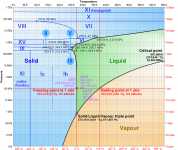Jaybird180
Member
I was explaining to my wife, why knowing the temperature is important in aviaiton. I have no idea why my car has an alert at 37degF. But in the discussion, I explained that the boiling point of water increases when water is in a sealed container due the increase in pressure. However, I have no idea what happens to the freezing point of water as pressure is reduced.
So, take me in a flight in an imaginary parcel of air. it is 33degF at the surface and at 3,000 feet the temperature is 32. There is no visible moisture. As you continue the climb, the temperature remains exactly 32degF and a cloud layer is at 5,000ft with tops at 10,000 feet. As the barometric pressure reduces what happens to the ice accumulating on the airframe?
So, take me in a flight in an imaginary parcel of air. it is 33degF at the surface and at 3,000 feet the temperature is 32. There is no visible moisture. As you continue the climb, the temperature remains exactly 32degF and a cloud layer is at 5,000ft with tops at 10,000 feet. As the barometric pressure reduces what happens to the ice accumulating on the airframe?

